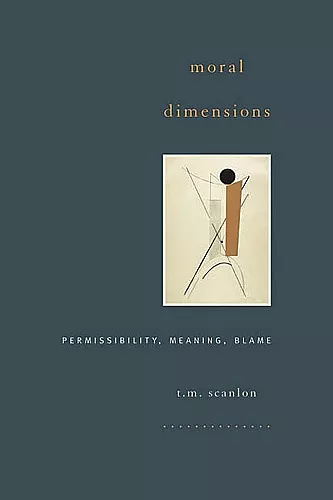Moral Dimensions
Permissibility, Meaning, Blame
Format:Paperback
Publisher:Harvard University Press
Published:30th Oct '10
Should be back in stock very soon

In a clear and elegant style, T. M. Scanlon reframes current philosophical debates as he explores the moral permissibility of an action. Permissibility may seem to depend on the agent’s reasons for performing an action. For example, there seems to be an important moral difference between tactical bombing and a campaign by terrorists—even if the same number of non-combatants are killed—and this difference may seem to lie in the agents’ respective aims. However, Scanlon argues that the apparent dependence of permissibility on the agent’s reasons in such cases is merely a failure to distinguish between two kinds of moral assessment: assessment of the permissibility of an action and assessment of the way an agent decided what to do.
Distinguishing between these two forms of assessment leads Scanlon to an important distinction between the permissibility of an action and its meaning: the significance for others of the agent’s willingness to act in this way. An action’s meaning depends on the agent’s reasons for performing it in a way that its permissibility does not. Blame, he argues, is a response to the meaning of an action rather than its permissibility. This analysis leads to a novel account of the conditions of moral responsibility and to important conclusions about the ethics of blame.
Scanlon offers a detailed account of a new analysis of key distinctions in theoretical ethics. These distinctions have very real consequences in a wide variety of practical issues, including debates regarding justified acts of war, the effort to justify terror or campaigns against terror, and seemingly intractable debates in biomedical ethics. Scanlon examines the permissibility of actions and the evaluations of actors, with a new account of both the initial--and as he sees it, illusory--attraction of the "doctrine of double effect." He argues that the illusion stems from confusion between two types of moral judgment, which apply principles in what Scanlon terms either "critical" or "deliberative" uses. Scanlon uses this difference to make an important new distinction between the permissibility of actions and their meaning, and to develop accounts of blame (linked to the meaning of an action) and moral responsibility that bear close attention. -- J. H. Barker * Choice *
The first half of the book, on permissibility and meaning, amounts to masterful and insightful philosophical housekeeping. The second half is revolutionary in the ways it tells us to think about blame. -- Allan Gibbard * London Review of Books *
Moral Dimensions is a penetrating study that forces--and enables--us to see the moral landscape in a fresh and nuanced way...Moral Dimensions culminates in a masterly exploration of blame, understood as a distinctive response to meaning. -- Gary Watson * Times Literary Supplement *
ISBN: 9780674057456
Dimensions: unknown
Weight: unknown
264 pages